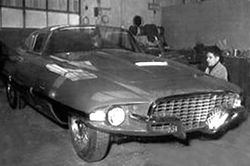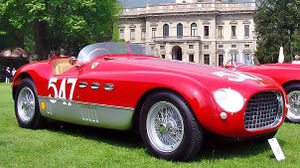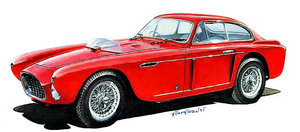Ferrari America
| Ferrari America 340, 375, 410, 400, 500, 365 | |
|---|---|
| Manufacturer: | Ferrari |
| Class: | front-engined GT car |
| Production: | 1951 — 1967 |
| 340 America | |
| Production: | 1951 — 1952 |
| Body styles: | Coupe Roadster |
| Engines: | 4.1 L V12 |
| 375 America | |
| Production: | 1952 — 1955 |
| Body styles: | Coupe Roadster |
| Engines: | 4.5 L V12 |
| 410 Superamerica | |
| Production: | 1955 — 1959 |
| Body Styles: | Coupe Roadster |
| Engines: | 5.0 L V12 |
| 400 Superamerica | |
| Production: | 1959 — 1964 |
| Body styles: | Coupe Roadster |
| Engines: | 4.0 L V12 |
| 500 Superfast | |

| |
| Production: | 1964 — 1966 |
| Body Styles: | Coupe Roadster |
| Engines: | 5.0 L V12 |
| 365 California | |
| Production: | 1966 — 1967 |
| Body Styles: | Roadster |
| Engines: | 4.4 L V12 |
| This article is part of the automobile series. | |
Ferrari's highest-end models in the 1950s and 1960s were the Americas. They were large touring cars with the largest V12 engines and often had custom bodywork. All America models used a live axle in the rear, were front-engined, and had worm and sector steering.
The America series was based on a series of concept cars which bore the Superfast name. Therefore, the final true member of the America production family finally bore that name instead: The 500 Superfast.
340 America
The first America cars were the 340. Using the new Lampredi V12 developed for Formula 1 racing, the 340 America could produce over 200 hp. Bodywork was done by Pinin Farina and Vignale. The 340 was produced for only about one year, replaced by its larger-engined brother, the 375 America.
:See also the 340 F1, a Formula One racer, and 340 America, a GT car
The Ferrari 340 MM was a Ferrari race car. It was a more powerful version of the 340 Mexico which was intended for the Carrera Panamericana. The use of Weber carburettors helped the 340 achieve 300 hp, some 20 more than its Mexico counterpart.
340 Mexico
375 America
| Ferrari 375 America |
|---|
| Ferrari 375 America |
|---|
Another Pininfarina and Vignale car, the 375 used the new 4.5 L Lampredi engine with up to 300 hp (224 kW). The 340 and 375 were expensive and exclusive - only about 40 were built from late 1951 through 1955.
375 MM "Ingrid Bergman"
Sergio Scaglietti and his Carrozzeria Scaglietti were commissioned by director Roberto Rossellini to custom build a one off version of the 375 MM with custom bodywork for his wife, actress Ingrid Bergman. This design later became the inspiration for the car which would be named after Scaglietti himself, the Ferrari 612.
Ironically though, Ms. Bergman wasn't too fond of the car, or of Rossellini's love for Ferraris in general.
400 Superamerica
The 400 Superamerica had a smaller 4.0 L Colombo engine, but produced as much power as its predecessor. It debuted in 1959 as 410 production ended, and was available as a coupe, spider, or cabriolet with custom Pinin Farina bodywork. Four-wheel disc brakes were a new addition. 50 400s had been built when the 400 stepped aside in 1964.
410 Superamerica
| Ferrari 410 Superamerica |
|---|
As if the custom, low-volume America was not fast enough, Ferrari produced another line of America cars, beginning with the 1955 410 Superamerica. The engine was now up to 5.0 L with 340 hp (254 kW) available. A 1957 Superamerica III had triple Weber carburetors for even more power.
Each 410 Superamerica had custom bodywork, with a few by Boano and Ghia but most by Ferrari stalwart, Pininfarina. The price was extremely high — at US$16,800, the 410 Superamerica offered at the New York Auto Show by importer, Luigi Chinetti, was more than twice as expensive as the Mercedes-Benz 300SL "Gullwing" exhibited by Max Hoffman. Just a few (14 to 35) were built when the series ended in 1959.

400 Superfast
| Ferrari 400 Superamerica Superfast IV by Pininfarina |
|---|
500 Superfast
The end of the top-line America series was the 1964 500 Superfast. Early in development, and even into production, these cars were to be called "Superamericas", but the decision was made at the last moment to use "Superfast" instead. The engine was again a 5.0 L Lampredi, but 400 hp (298 kW) was available now, pushing the car to 170 mph (274 km/h). The chassis was based on the contemporary 330 GT 2+2, and bodywork was again done by Pinin Farina. 37 cars were made to 1966, including 12 "series II" models with an updated 5-speed transmission.
365 California
The 1966 365 California was a stepchild model. It used the America's chassis, with its 2650 mm wheelbase and live axle rear suspension, but had the 4.4 L Colombo V12 from the other 365 cars. Just 14 of the open roadsters were built, and production ended in 1967.
| Ferrari timeline, 1948-1967 | Ferrari road car timeline 1960s-1990s > | |||||||||||||||||||||
| Type | 1940s | 1950s | 1960s | |||||||||||||||||||
| 7 | 8 | 9 | 0 | 1 | 2 | 3 | 4 | 5 | 6 | 7 | 8 | 9 | 0 | 1 | 2 | 3 | 4 | 5 | 6 | 7 | 8 | |
| Sports | 125 S | 166 S+166 SC | 195 S | 212 Exp | 225 S | 250 MM | 250 Monza | 250 GT Tour de France | 250 GT SWB | 250 GTO | 250 LM | |||||||||||
| 159 S | 250 S | 250 Export | ||||||||||||||||||||
| GT | 166 Inter | 195 Inter | 212 Inter | 250 Europa | 250 GT Europa | 250 GT Boano | 250 GT Ellena | 250 GT Coupe PF | 250 GT Lusso | 330 GTC | 365 GTC | |||||||||||
| 275 GTB | 275 GTB/4 | |||||||||||||||||||||
| Spyder/Cabriolet | 250 GT | 275 GTS | 330 GTS | 365 GTS | ||||||||||||||||||
| 2 plus 2 | 250 GT/E | 330 GT | 365 GT | |||||||||||||||||||
| America | 340 | 375 America/MM | 410 Superamerica | 400 Superamerica | 500 Superfast | 365 California | ||||||||||||||||

